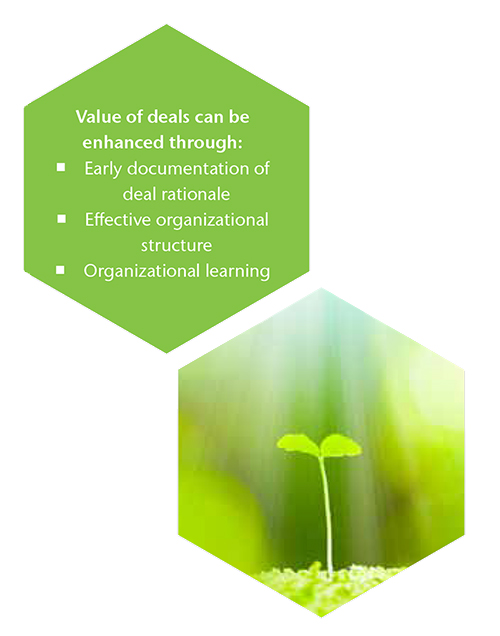
Enhanced Value Captured in Deals
Corporations and private equity firms continue to look to acquisitions for growth; in fact it is considered impossible to build world-class organizations without doing such deals.
Research shows that in the first decade of this century, those companies that engaged in M&A outperformed those that did not. Studies have shown however, that up to 70% of large deals fail to create meaningful shareholder value, with the top three reasons for derailment being:
- Ignoring integration challenges
- Overestimating synergies
- Not retaining key employees
It may be that an overemphasis on financial metrics when setting the business case for a deal, and a lack of effective measurement of operational and peoplerelated issues are the cause of this. Large organizations are often accused of working in silos, and in a deal situation, this may lead to less effective coordination of resourcesand poor risk management.
This article aims to address several key themes we feel are relevant, based on our experience working on deals around the world.
A clear process
Early documentation of the deal rationale and assumptions used in the business case allow due diligence teams to conduct their jobs more effectively, as there is a clear direction.
This allows organizations to assess their progress against the original rationale, respond to issues proactively, and reduce inefficiencies created by a lack of clarity between the different parties involved.
One of the most challenging parts of the M&A process is ensuring that all parties understand the rationale for the transaction, as this determines how performance targets are set through to integration.
In our experience, in successful deals, non-financial metrics such as employee engagement, talent acquisition, and retention are measured throughout the deal life cycle in some way. From our observation, the use of performance metrics in deals in leading organizations has been shown to lead to better communication across all parties; clarity of decision making, problem solving and conflict resolution, and performance evaluation.
One of the keys to successful M&A is to have a repeatable model, stressing the importance of a focused set of skills and capabilities that can be applied consistently in creating value. We find there are few organizations with an end-to-end process that is well implemented and clearly defines roles and responsibilities and milestones throughout the deal’s life cycle.
The agreement of a timetable with milestones for achieving targets is important to react to deviations from the original plan, as often occurs in deals. Any slip-ups can then be reacted to with greater agility and extra time or resources applied to achieve targets, particularly as these will relate back to the deal rationale, and why the company entered into the transaction.
Organisational effectiveness
How effectively an organization is structured for acquisitions has a bearing on how successful it will be at making deals. It is important to understand how decisions are made during the acquisition process, and how clearly the logic for value creation is decided upon, when arriving at the decision to make an acquisition. Firms may have a separate M&A function or this may be embedded within Corporate Development or Strategy.
However it is structured, organizational effectiveness for transactions is an important capability; in fact, it can be a core competence. This function can provide strategic direction and coordinate the various stakeholder groups to ensure that strategic objectives and implementation are aligned.
Additionally, the tools and processes supporting the transaction process, such as strong project management, play a very important role.
Some organizations, typically those serial acquirers experienced in deal making with significant in-house capabilities, have an overall deal playbook, with defined processes for the different stakeholder groups at different stages. Each deal is different, so any playbook has to be fairly easy to adjust and customize for deal specifics, and cannot work if it is too prescriptive. Those companies experienced in deals tend to have comprehensive process flows that can be adapted easily to specific deal situations.
Often, there are materials available during different deal phases, but these are not embedded through agreed processes. As a result, intellectual capital is not captured centrally and there is often duplication. In a deal environment, when time is of the essence, this must impact on value capture.
Interestingly, some companies with very detailed playbooks report that though these are in place, they are not used. The existence of a playbook seems variable within companies – some areas have them and some don’t. One of the most useful insights on the use of playbooks in deals is the importance of focusing on deliverables, rather than processes, as this is what creates value.
Organisational learning
Post acquisition audits and organizational learning are weak in many organizations. This stage may be neglected, but can provide very useful insights to facilitate a higher success rate in future acquisitions.
Organisational learning is a key enabler of success, and calls for codification of the experience gained by participating in deals, in the form of tools, templates, and documentation to enable replication through training and knowledge sharing.
The consistent evidence that many acquisitions fail to create value suggests there is great potential for acquirers to learn from deal experience, and apply this to future deals. Taking this idea further, building this learning process into core M&A competence-building and strategy can lead to effective and efficient management of deals and create a sustainable competitive advantage.
Developing performance metrics and benchmarks through different deal phases facilitates organizational learning. Robust post-acquisition audits can contribute to effective learning and the development of successful acquisition programs; these should consist of performance benchmarks, including both short- and long-term objectives that are tailored to different types of acquisitions.
On closing, companies often find the wider deal team from different parts of the organization dissolves, and it becomes challenging to get them all back together for a review. Nonetheless, there needs to be a formal process for capturing lessons learned.
Even in organizations that conduct post-deal reviews, there is often no documentation of this, so the learning is only (hopefully) retained in the minds of the people working on the deal. One of the challenges is knowing at what point to conduct a post-deal review, as the integration process can be long.

Codification of knowledge and learning is important to ensure it can be referred to in future deals. Maintaining a central repository that can be easily referred to when initiating a new deal can be particularly challenging, especially when deal teams are geographically dispersed, and working on cross-border transactions.
Avoiding the pitfalls
While many of the themes identified as being ways to capture greater value in deals are not new, many organizations continue to suffer from value leakage by not addressing them.
Increasingly, we are seeing forward-looking organizations looking to implement robust solutions, such as Aon’s TransAction Manager Platform, to articulate the process through different deal phases, and bring consistency of approach, clear governance and accountability, and the opportunity to learn from their experience.
Making a connection between the deal rationale at the start and integration issues later on, allows for a more holistic approach to deal success. A more thoughtful approach to how to organize effectively for deals allows for the operational and human capital integration risks to surface earlier in the process, rather than focusing solely on financial performance.
Authors
Javad Ahmad
Associate Partner & VP, Middle East, Turkey and Africa Head
Aon Strategic Advisors & Transaction Solutions
[email protected]
Get in touch
